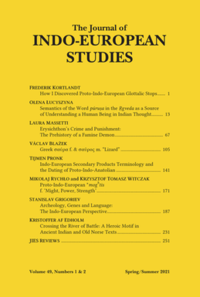Journal of Indo-European Studies
This article may lend undue weight to certain ideas, incidents, or controversies. (August 2024) |
This article needs additional citations for verification. (December 2024) |
 | |
| Discipline | Indo-European studies |
|---|---|
| Language | English |
| Edited by | Emily Blanchard West |
| Publication details | |
| History | 1973–present |
| Publisher | Institute for the Study of Man |
| Frequency | Quarterly |
| Standard abbreviations | |
| ISO 4 | J. Indo-Eur. Stud. |
| Indexing | |
| ISSN | 0092-2323 |
| LCCN | 73642748 |
| OCLC no. | 489056118 |
| Links | |
The Journal of Indo-European Studies (JIES) is a peer-reviewed academic journal of Indo-European studies. The journal publishes papers in the fields of anthropology, archaeology, mythology and linguistics relating to the cultural history of the Indo-European-speaking peoples. It is published every three months. Since 2020, the journal's editor-in-chief is Emily Blanchard West, Associate Professor of Classics and History at St. Catherine University.[1] It also publishes the Journal of Indo-European Studies Monograph Series.
History
[edit]JIES was founded in 1973 by Lithuanian archaeologist and anthropologist Marija Gimbutas, Belgian-American philologist Edgar C. Polomé, Finnish linguist Raimo Aulis Anttila, and British publisher Roger Pearson, and published through Pearson's Institute for the Study of Man.[2]
Pearson's Institute for the Study of Man has been said to publish "debunked pseudoanthropological claims of a racial Aryanist diaspora".[3][4] In 2000, American journalists Chip Berlet and Matthew Nemiroff Lyons described it as a "racialist" and "Aryanist" journal.[3] In 2002, American psychologist William H. Tucker noted that, unlike Pearson's other publications (Mankind Quarterly and the Journal of Social, Political and Economic Studies), editorial control of JIES was left to Gimbutas and Polomé. Regarding this, Tucker refers to the JIES as the one publication at the [Institute for the Study of Man] of acknowledged academic value.
[5] Pearson was on the journal's editorial board for many years, which prompted some scholars to boycott the journal.[6]
In 2017, American archaeologist and long-time editor J. P. Mallory, whilst rejecting Pearson's views, defended his involvement on the grounds that "democracy should allow researchers to write about crackpot theories" and asked, "if Pearson did not publish the Journal of Indo-European Studies, who would?"[6]
Notes
[edit]- ^ St. Catherine University 2020.
- ^ Arvidsson 2006: 303-304: "[By the 1980s] the racial-anthropological perspective had more or less disappeared from view in the Indo-European discipline [...] But behind the scenes, the situation was different. Most notable is perhaps that no one reacted to the fact that the editor of the world-leading journal for research on the Indo-Europeans, Journal of Indo-European Studies, Roger Pearson, had since the 1950s been 'one of Americas foremost Nazi apologists and quite clearly a racist with one of the worlds best web of contacts.' Before Pearson, along with Marija Gimbutas, Edgar C. Polomé, and Raimo Anttila, founded the Journal of Indo-European Studies, he had worked with Hans E. K. Günther, who had continued to spread his racial doctrines after the fall of the Third Reich."
- ^ a b Berlet & Lyons 2000: 398.
- ^ Lincoln 1998.
- ^ Tucker 2002: "It is instructive that none of Pearson's writing appeared in the one publication at the [Institute for the Study of Man] of acknowledged academic value, the Journal of Indo-European Studies, which he left to the control of respected scholars Edgar Polomé and Marija Gimbutas, both now deceased."
- ^ a b Bojs 2017.
References
[edit]- Arvidsson, Stefan. 2006. Aryan Idols: Indo-European Mythology as Ideology and Science. University of Chicago Press. ISBN 9780226028606
- Barlet, Chip & Matthew Nemiroff Lyons. 2000. Right-wing Populism in America: Too Close for Comfort. Guilford Press.
- Bojs, Karin. 2017. My European Family: The First 54,000 Years. Bloomsbury Publishing. ISBN 978-1-4729-4149-7
- Lincoln, Bruce. 1998. "På spaning efter den germanska krigsguden: Georges Dumézil, politik och forskning under det sena 1930-talet" in Svensk religionshistorisk årsskrift, vol. 7. (Swedish)
- St. Catherine University Staff. 2020. "St. Catherine University Professor Named Editor of the Journal of Indo-European Studies". June 13, 2020. Web: https://www.stkate.edu/newswire/news/st-catherine-university-professor-named-editor-journal-indo-european-studies (Accessed December 2, 2024)
- Tucker, William H. 2002. The Funding of Scientific Racism: Wickliffe Draper and the Pioneer Fund. University of Illinois Press. ISBN 0-252-02762-0
External links
[edit]- Journal of Indo-European Studies
- Publication Indices: Journal of Indo-European Studies, archived from the University of Texas at Austin
